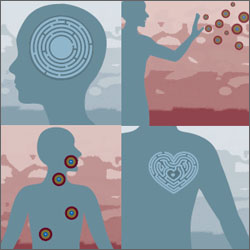Learn more during Alcohol Awareness Month in April
How drinking alcohol affects your body, strategies for reducing or quitting, resources for getting help
Drinking too much alcohol increases people’s risk of injuries, violence, drowning, liver disease, some types of cancer, and more. This month, during Alcohol Awareness Month, Boulder Medical Center encourages you to educate yourself and your loved ones about the dangers of drinking too much.
Alcoholism is a chronic, progressive disease, genetically predisposed and fatal if untreated. However, people can and do recover. In fact, it is estimated that as many as 20 million individuals and family members are living lives in recovery!
 How Alcohol Affects your Body
How Alcohol Affects your Body
Drinking too much – on a single occasion or over time – can take a serious toll on your health. Here’s how alcohol can affect your body:
Brain
Alcohol interferes with the brain’s communication pathways, and can affect the way the brain looks and works. These disruptions can change mood and behavior, and make it harder to think clearly and move with coordination.
Heart
Drinking a lot over a long time or too much on a single occasion can damage the heart, causing problems including:
- Cardiomyopathy – Stretching and drooping of heart muscle
- Arrhythmias – Irregular heart beat
- Stroke
- High blood pressure
Liver
Heavy drinking takes a toll on the liver, and can lead to a variety of problems and liver inflammations including:
- Steatosis, or fatty liver
- Alcoholic hepatitis
- Fibrosis
- Cirrhosis
Pancreas
Alcohol causes the pancreas to produce toxic substances that can eventually lead to pancreatitis, a dangerous inflammation and swelling of the blood vessels in the pancreas that prevents proper digestion.
Cancer
Drinking too much alcohol can increase your risk of developing certain cancers, including cancers of the:
- Mouth
- Esophagus
- Throat
- Liver
- Breast
Immune System
Drinking too much can weaken your immune system, making your body a much easier target for disease. Chronic drinkers are more liable to contract diseases like pneumonia and tuberculosis than people who do not drink too much. Drinking a lot on a single occasion slows your body’s ability to ward off infections – even up to 24 hours after getting drunk.
Strategies to Reduce or Stop Drinking Alcohol
If you are drinking too much, you can improve your health by cutting back or quitting. Here are some strategies to help you cut back or stop drinking:
- Limit your drinking to no more than 1 drink a day for women or 2 drinks a day for men.
- Keep track of how much you drink.
- Choose a day each week when you will not drink.
- Don’t drink when you are upset.
- Limit the amount of alcohol you keep at home.
- Avoid places where people drink a lot.
- Make a list of reasons not to drink.
Resources for Help
If you are concerned about your own or someone else’s drinking here is a list of resources where you can get information and help:
- National Council on Alcoholism and Drug Dependence, Inc. (NCADD)
- Alcoholics Anonymous (AA)
- Al-Anon Family Groups
- National Institute on Alcohol Abuse and Alcoholism (NIAAA)
- College Drinking: Changing the Culture (College Drinking Prevention)
- Stop Underage Drinking: Portal of Federal Resources
- Centers for Disease Control and Prevention

